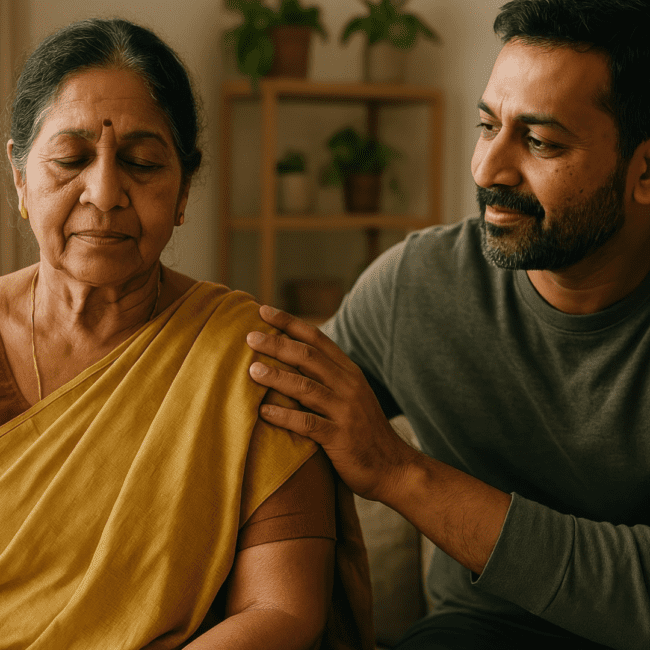You don’t always notice it right away. Maybe your mother needs a bit more time to climb the stairs. Or perhaps your father, who never missed a name, struggles to recall someone from a family wedding. These moments are quiet and small, but they linger. They make you pause.
Caring for an older adult, whether you’re a son, daughter, neighbour, or hired caregiver, isn’t something most of us are fully prepared for. There’s no formal training in how to spot the early signs of ageing or how to respond with the right balance of support and space. It often starts with simple awareness and grows into something deeper.
There’s No One Way to Age
One of the most important things to remember is that every person ages differently. Some seniors stay active and fiercely independent well into their 80s. Others may begin to slow down in their early 60s. Personality, health history, mindset, lifestyle, and even relationships all play a part.
Yet despite the uniqueness of each person’s path, caregivers often notice certain patterns. These patterns can help us feel less alone and better prepared. And more than that, they remind us that while there’s no single “formula” for ageing, there is a rhythm, a journey that unfolds over time.
A Gentle Look at the Stages of Ageing
Rather than rigid stages, think of these as broad phases many older adults experience. They’re not the same for everyone, and they may not follow a straight line. But understanding them can help you support your loved one more confidently.
Stage 1: Active & Independent
At this stage, your loved one is likely managing their day-to-day life well. They may still drive, cook, socialise, and even travel. As a caregiver, your role might be to stay in touch, offer emotional support, or lend a hand occasionally, with technology, health check-ups, or errands. Mostly, you’re just a reassuring presence.
Stage 2: Slowing Down & Reaching Out
Here, you might notice small shifts, forgetting appointments, feeling more tired, or needing help with groceries. It’s not dependency, but a gradual openness to support. As a caregiver, this is a good time to step in gently. Your patience and attentiveness mean a lot, especially when independence still matters deeply to them.
Stage 3: More Regular Support
By this point, help with daily tasks becomes more routine. You might be organising medications, preparing meals, or assisting with hygiene. This stage often brings emotional weight; your loved one may be more aware of their limitations, and you might feel stretched trying to balance it all. It’s a time for compassion, routine, and honest conversations.
Stage 4: Fragility & Full-Time Care
In this phase, health concerns become more complex. Your loved one may need full-time care, either at home or in a supportive facility. The focus shifts to safety, comfort, and dignity. As a caregiver, your presence is not only practical but deeply reassuring. You are their anchor in a world that may feel increasingly uncertain.
Your Role Will Keep Evolving
Caregiving is not a static responsibility. It’s a role that grows with time, shifting from gentle support to decision-making, and sometimes even advocacy. Whether you’re a family member or a trained professional, your role will challenge and change you. And that’s okay.
There will be days when you feel unsure, tired, or even guilty, especially if you’re juggling other responsibilities or living far away. But your efforts, your presence, and your care matter more than you may realise.
Support Matters More Than Solutions
It’s easy to feel like you need to “fix” things, find the right medication, the safest walker, the best facility. And yes, those are important. But ageing isn’t a puzzle to be solved. It’s a stage of life that deserves empathy, respect, and companionship.
Being present matters just as much, if not more, than ticking tasks off a list. A quiet afternoon together, a favourite meal, a shared memory: these are the real pillars of care.
Walking the Path Together
There is no perfect map for this journey. But there is connection, courage, and care. There is learning and letting go. And there is beauty, even in the challenges.
If you’re a caregiver, know that you are not alone. There is a community of others walking similar paths, learning to balance respect with responsibility, presence with planning. Don’t hesitate to ask for help, share your experiences, or simply take a break when needed.
Because at its heart, ageing is not about decline. It’s about change. And caregiving is not just about duty, it’s about love, patience, and walking beside someone, one step at a time.
Need help navigating your loved one’s ageing journey?
Connect with our care experts at Samarth for personalised guidance, support options, and resources that truly understand what you’re going through.






